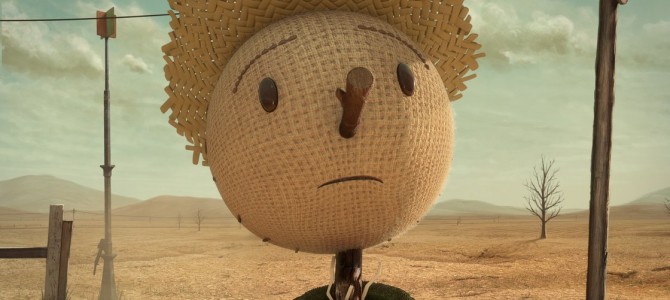It’s been surprising to see so many smart people profess their admiration for the much-hyped (“haunting“, “Oscar-ready“, “poignant“) animated short produced by Mexican fast food chain Chipotle. The Scarecrow, which features a Fiona Apple cover of Willy Wonka and the Chocolate Factory’s “Pure Imagination”, is actually a ludicrous fable about the future of agriculture. As Chipotle explains:
In a dystopian fantasy world, all food production is controlled by fictional industrial giant Crow Foods. Scarecrows have been displaced from their traditional role of protecting food, and are now servants to the crows and their evil plans to dominate the food system. Dreaming of something better, a lone scarecrow sets out to provide an alternative to the unsustainable processed food from the factory.
Well, no one is going to call you ‘Oscar-ready’ until you cook up a script about dystopian capitalism, right? Even so, you could treat the video, produced to promote Chipotle’s free iOS game, as a harmless ad aimed at those in the market for healthier foods. That is, until, pundits start extolling the high moral virtues of the piece or Chipotle’s chief marketing officer Mark Crumpacker starts telling USA Today that the company is “trying to educate people about where their food comes from.”
As big a fan as I am of Chipotle’s brand of fast food – fighting for the little guy with a mere 1,500 restaurants and $800 million in revenue last year! – I enjoy it best without self righteousness that taps into paranoia about food, namely genetically modified crops, Big Ag and factory farming.
What it doesn’t do is tell us where “food comes from.” The Chipotle Scarecrow slogs to his miserable job at a smoke-spewing factory where nothing grows but caged chickens and cows. For some strange reason, in this imaginary world, government subsidized Big Agriculture chooses to leave massive swaths of land fallow or desolate, when, in fact, where food actually comes from, farm productivity has increased dramatically over the past decades and the resources required to keep production high has declined. Not exactly the stuff of dystopia.
After leaving the factory, Scarecrow finds a bit of fresh produce on his own small patch of land. Inspired, he starts assembling a burrito — skipping the slaughter of any cute animals, so it must be a vegetarian — because apparently there’s a scarcity in the fresh Mexican food market (except perhaps down the road at the local Qdoba or Baja Fresh or Rubio’s Fresh Mexican Grill or so on). Inevitably, we are implored to “Cultivate a better world.”
The local farm movement might make urban Millennials (who are, strangely enough, according to the company, “skeptical of brands that perpetuate themselves”) feel better about their fast food, but it is a bad idea environmentally and a terrible idea for those who struggling to pay for food. Many Americans can drop ten bucks on a burrito lunch, many others can’t. Maybe the latter group makes a calculation to buy a “dollar meal” rather than a ten-dollar meal for their family, despite the level of free ranging their meat may have enjoyed during its lifetime. Maybe, and this may seem radical to some readers, others prefer the taste of salty fast food. But what agribusiness and food farming entails is more complicated than critics (and really, most of the leading advocates in this area will never be satisfied) would have us believe.
What we do know is that we’re producing lots of moderately priced nutrition for lots of people. That should be a lot more morally concerning to us than a chicken’s comfort level. And while no one should get too worked up about a cartoon, we also shouldn’t underestimate the damage all this scaremongering on the cultural front, both implicit and explicit, can do.
Follow David Harsanyi on Twitter @davidharsanyi.









